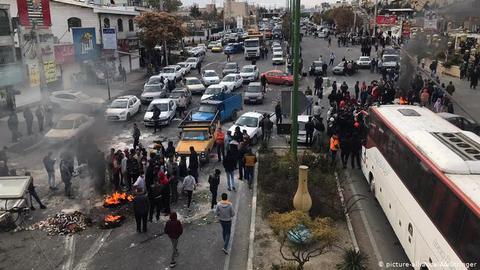The Iranian embassy in London has lodged an official complaint against Persian language TV networks broadcasting from the United Kingdom, citing “bias” and “distorted reporting” of the recent protests across the Islamic Republic.
Hamid Baidinejad, the Iranian ambassador to the United Kingdom, said the embassy had lodged a complaint with the Office of Communications (Ofcom), the British media regulatory authority, against Manoto TV, Iran International and BBC Persian.
Although the complaint is a clear attack on the networks, independent Iranian media should welcome the move. After years of Iranian officials accusing the media of irresponsible reporting and trying to undermine the Islamic Republic, the appeal to Ofcom will finally provide the opportunity for these allegations to be disproved by an independent, neutral body with international recognition.
It will also lead to renewed attention to Iran’s repeated persecution of journalists working for BBC Persian, and the targeting of their families. As many as 45 journalists working for the network have had their assets and properties frozen, and members of their families have been interrogated, harassed, faced travel bans and even been arbitrarily arrested.
Baidinejad posted on Twitter in a non-diplomatic, personal capacity, saying that the networks, which he described as “enemies,” had broadcast "a biased and distorted representation of the recent developments in Iran” and said they helped stoke widespread violence in Iran and should to be prosecuted.
The ambassador’s comments are unprecedented. During his three and a half years in the post, he has never filed an official complaint to Ofcom about Persian media operating in the United Kingdom, although he has been consistent in his criticism of the network, albeit in an unofficial capacity.
As part of its official complaint, the embassy will provide evidence that the networks have "invoked widespread violence against Iranian civil society institutions.” Ofcom is expected to review the evidence and, if appropriate, question the networks about their coverage of the protests to determine whether they had been biased or irresponsible in their reporting. If found guilty, the networks could be subject to fines and penalties. In some cases, if they are found to have committed serious violations against media regulatory laws, they can lose their licenses and their right to broadcast. However, given Iran's own media bias and officials' repeated attacks on independent media inside and outside Iran covering Iranian news and issues, this is unlikely to happen.
Prior to his announcement of the complaint against the networks, Baidinejad had regularly criticized BBC Persian employees on Twitter.
The UK ambassador’s announcement will not come as a surprise, but it will be regarded as yet another blow to hopes for improved relations between Iran and the UK, signaling that the Islamic Republic is prepared to jeopardize these relations on a routine basis in order to make its opinions on independent media known.
visit the accountability section
In this section of Iran Wire, you can contact the officials and launch your campaign for various problems




















comments